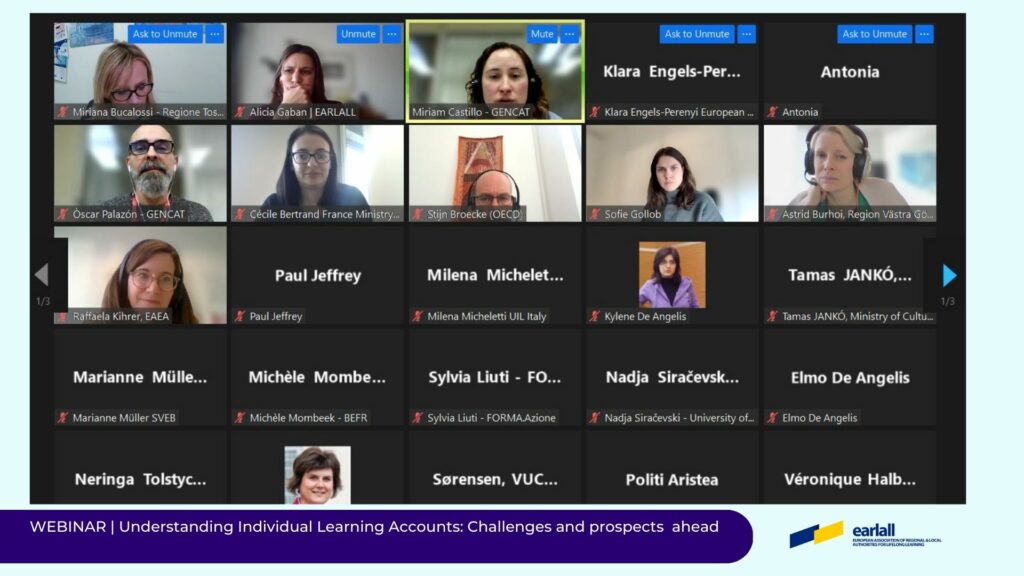Individual Learning Accounts in Europe: Different Tools, Similar Goals
20/02/2023

On February 9 2023, EARLALL’s Working Group for Skills and Labour Market hosted a successful webinar ‘Understanding Individual Learning Accounts: Challenges and Prospects ahead’, welcoming over 60 online participants, to learn from a range of policy and regional perspectives about Individuals Learning Accounts (ILAs) in Europe. The online event was organised as a followed up to the webinar “European approach to Micro-Credentials” co-organised by SwissCore and EARLALL in May 2022.
The webinar began with a presentation from Ms Klara Engels-Perenyi, Policy Officer in the Skills Agenda Unit – DG Employment, Social Affairs & Inclusion from the European Commission. Ms Engels-Perenyi presented the Council’s Recommendation on Individual Learning Accounts as an enabling framework that seeks to promote the take-up of ILAs in Europe. She also highlighted the opportunities, and challenges of implementing ILA across all regions during the 2023 European Year of Skills, saying that ‘there are many countries and regions with a similar idea of ILA. We don’t want everyone to use the same model because that model must be adapted to local needs. From our point of view, the involvement of local stakeholders is very important to have a successful ILA (or similar) scheme in place. Particularly for regions facing a severe labour shortage issue, ILAs become a suitable tool to boost upskilling and reskilling in the active working population.’

Following the European Commission’s introduction, Mr Stijn Broecke, Senior Economist at the OECD Employment, Labour and Social Affairs Directorate, presented ‘OECD’s ILA’s: 8 lessons for effective design and implementation’ included in the Report on Individual Learning Accounts (2019). ‘ILAs are not a solution to all training problems’ is listed as one of the main reasons in the OECD’s report. As Mr Broecke explained, ‘if the problem is about increasing choice for individuals in their learning journeys, then ILAs may be the solution. But, if the problem is about training only low-skilled workers with higher skills, then this may not be the role of ILA. It is very important to ILAS as part of a wider ecosystem of training on offer.’
From this policy perspective, as Mr Broecke said, ILAs are not a solution for all training issues and are implemented through varying mechanisms across Europe. Then participants had the opportunity to learn from the “only real ILA example in Europe the French Personal Training Account “Compte Personnel de Formation” (CPF) which was the first and only to be introduced in Europe in 2004. Ms Cécile Bertrand, Head of the Personal Training Account (Compte Personnel de Formation), General Delegation for Employment and Vocational Training (France), explained that since the online platform, mon compte formation was launched, has undergone a series of transformations and has now offered 2.1 million training opportunities in France in the year 2021. The CPF works as a platform where all working, job-seeking or economically active citizens can log in and check their entitlements to training, seek accompaniment through their learning journeys, find a training session, obtain additional funding, perform the training and gain certification of participation.
From policy to regional experiences
In the final session, participants then learnt from regional experts implementing equivalents to the ILA system. The floor was taken by Ms Sofie Gollob, from the Swiss Federation for Adult Learning (SVEB, Switzerland), Ms Miriana Bucalossi, from Tuscany Region (an EARLALL member), Ms Antonia Rodríguez Ballesta from Catalan Department of Education Catalonia Region (an EARLALL member) and Mr Geoff Hicks, from the Welsh Government. All four regions have been implementing a system where adult learners can receive financial support to train adults in improving their basic skills, further skills or upskilling. In each case, the following measure has been implemented:
- Swiss Federation for Adult Learning: Education Voucher for Basic Skills (Presentation here)
- Tuscany, Italy: Individual Learning Accounts (Presentation here)
- Catalonia, Spain: Recognition of Professional Experience (Presentation here)
- Wales, UK: Personal Learning Accounts (Presentation here)
While the target market and the methodology for each regional system varies, all four examples highlighted the common opportunities for this kind of service for adult learners:
-
offering equal opportunities to those without professional qualifications and from a low-income or migrant background;
-
increasing employability after training; creating a new model of Public Employment Services active labour market policy;
-
stimulate VET providers to offer courses relevant to the labour market;
-
allowing learners to be flexible with the content and methodology of their learning and increasing ownership over learning.
However, alongside the opportunities for these services, the four regional experts indicated the following challenges in the future implementation for ILA systems:
-
reducing the dropout rate by learners as it is voluntary and requires no financial input from the learners;
-
continuously proposing consulting and guidance to participants; ensuring no fraud or scams in the collection of training offered;
-
linking these systems to a full package of other measures intended for adult learners;
-
how to offer reskilling to those who are not on low-income jobs and offering opportunities in both formal and informal education networks.
The webinar was therefore a fruitful exchange between regional representatives in EARLALL regional members, other European regional representatives and European Commission and OECD experts in the field.
The challenges of ILA may be difficult to surmount, but the bottom line is that there is an increasing range of opportunities for ILAs in the future, with regional initiatives being key to ensure that these schemes are relevant to the local labour market needs.
Materials:
- The recording is available on EARLALL’s YouTube channel
- Report
- Speakers presentations:
- Klara Engels-Perenyi, DG Employment, Social Affairs & Inclusion from the European Commission (Presentation here)
- Stijn Broecke, OECD Employment, Labour and Social Affairs Directorate (Presentation here)
- Cécile Bertrand, General Delegation for Employment and Vocational Training (France) (Presentation here)
- Sofie Gollob, Swiss Federation for Adult Learning: Education Voucher for Basic Skills (Presentation here)
- Miriana Bucalossi, Tuscany, Italy: Individual Learning Accounts (Presentation here)
- Antonia Rodríguez Ballesta, Catalonia, Spain: Recognition of Professional Experience (Presentation here)
- Geoff Hicks, Wales, UK: Personal Learning Accounts (Presentation here)




